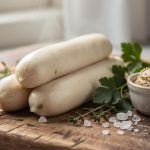Essential Factors for Selecting Durable Kitchen Knives in the UK
When choosing durable kitchen knives UK shoppers must prioritize the blade material. The most common materials offering excellent longevity are stainless steel, carbon steel, and ceramic. Stainless steel is popular for its corrosion resistance, making it ideal in the often humid UK kitchen environment. Carbon steel blades, while prone to some rust without care, deliver superior edge retention and sharper cuts but require diligent maintenance. Ceramic knives offer great hardness and retain sharpness longer but can be brittle and prone to chipping.
The kitchen knife buying guide UK stresses the importance of knife construction. Blades are generally either forged or stamped. Forged knives, made from a single piece of metal heated and shaped, provide better durability and balance. Stamped knives are cut from a sheet of metal and tend to be lighter and less robust but more affordable. Knife tang style also affects strength: full tang knives, with the metal running the full length of the handle, offer superior durability and control, essential for UK cooks who demand quality tools for frequent use.
This might interest you : What Are the Most Unique Historical UK Kitchen Tools?
Handle design and material are often overlooked but critical for long-term durability in varied UK kitchen conditions. High-quality knife handles should be made from water-resistant materials such as composite resin, pakkawood, or high-grade polymers to withstand moisture and temperature changes. Ergonomic designs enhance grip security, preventing slips during critical food prep tasks and enhancing user safety.
By focusing on these key factors—blade material, construction type, and handle quality—consumers can select durable kitchen knives UK that maintain performance and withstand regular kitchen challenges inherent in UK households. For more comprehensive insights, consider consulting a detailed .
Additional reading : How can you select the right UK kitchen equipment for baking?
Comparing Popular UK Kitchen Knife Brands and Retailers
In the UK, finding the best kitchen knives involves considering established brands known for quality and durability. Among the top UK kitchen knife brands are Robert Welch, Stellar, and Sabatier, each offering distinct advantages. Robert Welch stands out for its balance of craftsmanship and innovation, providing knives that are both durable and comfortable to handle. Stellar knives are praised for their robustness and sharpness retention, making them a go-to choice for both home cooks and professionals. Sabatier knives, often recommended in kitchen knife reviews UK, are celebrated for their traditional French design and exceptional cutting precision.
When deciding where to purchase these knives, buyers can turn to both high-street retailers and reputable online platforms. Department stores and specialist kitchenware shops ensure hands-on experience with the products, allowing customers to test weight and grip. Meanwhile, online retailers provide convenience and often competitive pricing, with many offering detailed kitchen knife reviews UK from verified buyers and experts alike. Websites focusing on authentic user feedback help shoppers identify the most durable options and highlight potential drawbacks.
Customer and expert reviews consistently emphasize key factors such as blade sharpness, handle comfort, and overall longevity. These insights are invaluable when comparing brands because they reflect real-world use across diverse cooking styles. Whether purchasing from a physical store or an online platform, assessing these attributes through trusted reviews guarantees a more informed and satisfactory choice. For those seeking more detailed guidance, exploring dedicated kitchen knife resources and feedback can offer additional clarity on selecting the optimal knife brand in the UK.
Price Ranges and Value Considerations for UK Consumers
Understanding how price intersects with quality and durability
When shopping for kitchen knives in the UK, price is a significant factor that often determines the balance between durability and performance. The UK market typically offers kitchen knives in three main price brackets: entry-level (under £30), mid-range (£30–£80), and premium (£80 and above). Each tier reflects expected attributes and longevity.
Entry-level knives may appeal to buyers seeking affordable durable kitchen knives UK residents can rely on for basic kitchen tasks. At this price point, knives often feature stainless steel blades with adequate sharpness but may require more frequent honing or replacement over time. These options suit casual cooks or those with budget constraints.
Mid-range knives, falling within the £30 to £80 bracket, offer a noticeable jump in craftsmanship and materials. Here, you often find better steel alloys and full-tang designs, which translate to stronger, longer-lasting blades. Such knives represent solid kitchen knife value UK consumers appreciate, delivering durability without the premium price.
Premium knives, priced above £80, are an investment in longevity and cutting precision. They often incorporate specialist steels and ergonomic handles, tailored for enthusiasts and professionals. While the initial cost is higher, these knives maintain sharpness longer and provide superior handling, making them worthwhile for those who cook frequently.
In summary, UK consumers should weigh their usage habits against budgets, opting for entry-level knives for light use and considering mid-range or premium knives for enhanced durability and performance. This approach ensures optimal kitchen knife value UK buyers seek.
Maintenance Tips for Extending Knife Longevity
Maintaining your kitchen knives properly is essential to prolong their lifespan and ensure peak performance in your UK kitchen. Proper kitchen knife maintenance UK begins with careful cleaning practices. Always wash knives by hand immediately after use with warm, soapy water, avoiding the dishwasher, which can dull blades and damage handles. Dry knives thoroughly to prevent rust and store them safely in a knife block, magnetic strip, or protective sheath to avoid nicks and accidents.
Regular sharpening and honing are crucial aspects of care for kitchen knives UK. Honing realigns the blade’s edge and should be done frequently—ideally before or after each use—to maintain sharpness. Use a honing steel at a consistent angle suited to the knife type. Sharpening, which removes metal to create a new edge, is necessary when honing no longer restores the blade’s sharpness. Use quality whetstones or professional sharpening services to achieve the best results and extend knife longevity.
Avoiding certain common mistakes will greatly improve your kitchen knives’ durability. Refrain from cutting on hard surfaces such as glass or stone, which can blunt blades quickly. Never use knives to pry open containers or cut frozen foods, as this can chip or break the blade. Additionally, avoid storing knives loosely in drawers where they can be damaged or damage other utensils.
By following these care for kitchen knives UK guidelines—cleaning promptly and gently, sharpening and honing regularly, and steering clear of damaging habits—you can significantly extend the life and efficiency of your invaluable kitchen tools.


